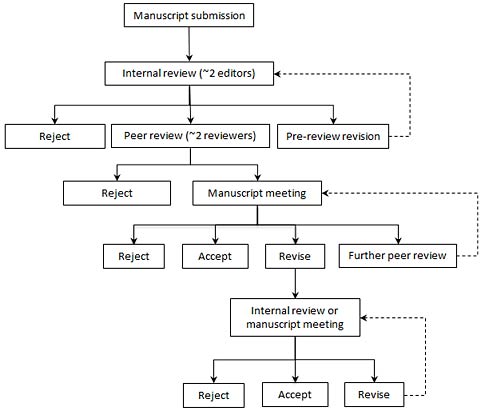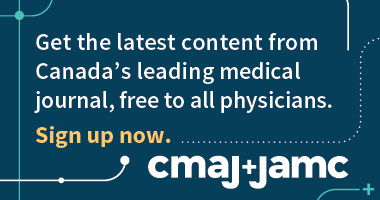Editorial process
Listen to Dr. Matthew Stanbrook, CMAJ deputy editor, demystify the editorial process on The Rounds Table podcast (at the 20 min mark).
The editorial process below applies to research and guideline articles. The process for other article types varies slightly.
Pre-accept

Description of Pre-accept steps
Flowchart diagramming stages in CMAJ's decision-making process. Workflow starts with “Manuscript submission“.
Step 1. Internal review by 2 or more editors. Possible outcomes are:
1.1 Reject
1.2 Pre-review revision (after this, manuscript returns to step 1)
1.3 Peer review
Step 2. Peer review by 2 or more external reviewers. Possible outcomes are:
2.1 Reject
2.2 Discussion at a manuscript meeting
Step 3. Manuscript meeting at which 3 or more editors discuss the manuscript. Possible outcomes are:
3.1 Reject
3.2 Accept
3.3 Further peer review (after this, manuscript returns to step 3)
3.3 Revise
Step 4. Submission of a revised manuscript. Revisions undergo internal review and sometimes discussion at a manuscript meeting (step 3). Possible outcomes:
4.1 Reject
4.2 Accept
4.3 Further revision (after this, manuscript returns to step 4)
Post-accept
Once accepted, a scientific manuscript editor edits the manuscript for clarity, brevity, style and accuracy. Scrutiny at this stage may reveal further areas where information is lacking or clarification is needed. Authors are asked to review an edited proof and respond to all queries. Before being finalized, a senior editor conducts a final review. You will be contacted should there be any follow-up comments or queries. Let the manuscript editor know if you will not be available after you have returned your proofs, and provide the name and contact information of a coauthor who can field questions in your absence.
Fast-tracking
Authors seeking accelerated peer review or publication should contact the editor well in advance of submitting and clearly justify (in writing) why their research findings merit fast-tracking. Reasons might include high importance of the research. Timing to coincide with a conference is unlikely to prompt fast-tracking.



